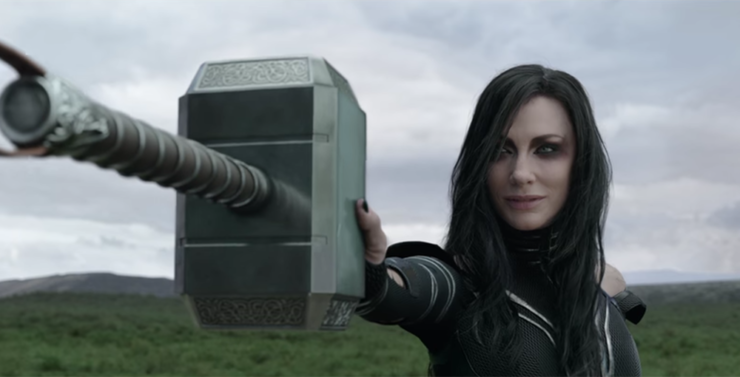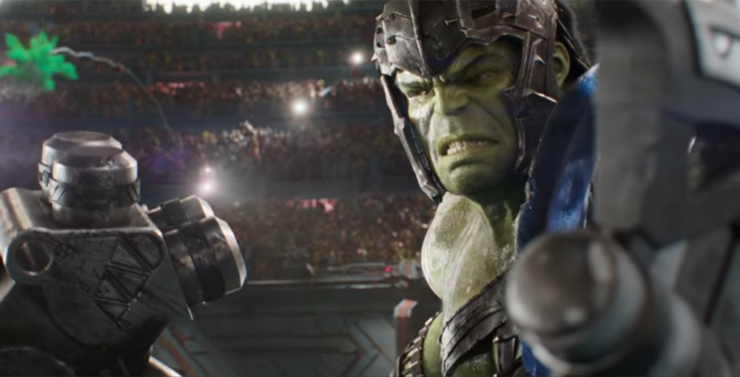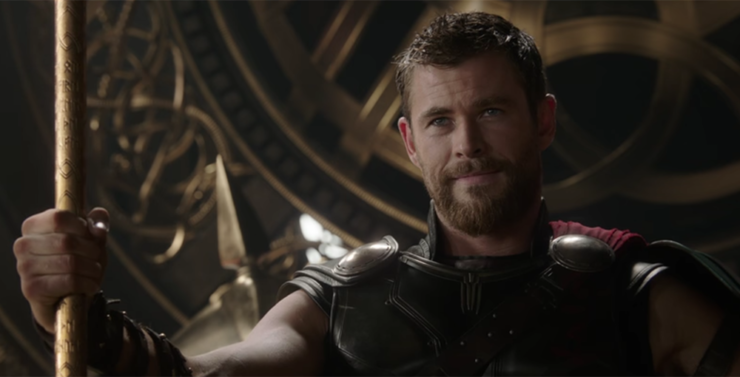Near the beginning of Avengers: Infinity War, the Guardians of the Galaxy happen across a catatonic Thor Odinson floating in space. Thor’s ship of Asgardian refugees has been decimated by Thanos and his Black Order. Thor is the lone survivor, and that but barely.
“How is this dude still alive?” Peter Quill asks after they pull Thor into their ship. “This is not a dude. You are a dude,” Drax replies, “This is a man.” This sets off a crisis of masculinity in Quill that begins with him trying to one-up the God of Thunder and ends with him inadvertently allowing Thanos to kill off half the population of the entire universe. Oops.
But perhaps Quill might have taken Drax’s jab better—and saved trillions of lives—had he known that Thor’s own journey from “dude” to “man” was pretty recent, having happened in the Marvel movie that sets up this one: Thor: Ragnarok. At heart, Ragnarok is about Thor’s arc from cocky hero to self-sacrificing leader, and his journey from trying to prevent Ragnarok to instigating it. Along the way, he comes into conflict and enters into alliances with a whole bunch of characters who have their own way of being “a man,” and none of them have anything to do with being male.
Ragnarok’s director Taika Waititi is a master at finding the humor in the tensions between different modes of masculinity. His vampire roommate mockumentary What We Do in the Shadows draws most of its jokes from the clashing personalities of the prim and proper Viago (played by Waititi himself), the lusty torturer Vladislav, the louche Deacon, the dim bro Nick, and the ancient monster Petyr. But the man they all admire most is Stu, the mild-mannered, cool-as-a-cucumber mortal who takes the existence of vampires and being disemboweled by werewolves in admirable stride.
Waititi’s foray into the Marvel Cinematic Universe pits an even broader variety of masculine archetypes up against each other, often literally, for humor and conflict. First we meet the fire-giant Surtur, hellbent on fulfilling his destiny of destroying Asgard. Surtur is literally a monster, but I admire his complete acceptance and comfort with who he is. He’s half a million years old at least and gets beaten down by both Odin and Thor, but that doesn’t stop him from embracing his destiny. We can all only hope for that kind of committed self-assurance in our later years.
Less self-assured is Thor’s adopted brother and occasional archenemy Loki, masquerading as his own father Odin in a move so Oedipal it’d make Freud blush. Loki’s stooge Skurge, now in charge of the Bifrost, isn’t any better. He uses his new position as gatekeeper to the cosmos mostly to collect crap like machine guns and Shake Weights to impress the ladies. When Hela shows up to claim Asgard, Skurge follows her, less out of any real ambition and more out of fear and habit. He’s not evil, he’s just unimaginative.
Thor and Loki set off to find Odin, whom they find in Norway thanks to Dr. Stephen Strange (if you’re wondering what sort of masculinity Strange represents: he’s a dick). Odin is wise and warm to his sons, even praising the spell Loki put him under. But he’s also impatient to die and doesn’t seem particularly concerned with the fact that his death will free his firstborn Hela from her imprisonment. Odin’s a man who never looks back, both out of a desire for progress and a fear of the shadows that lie in the past (Waititi frames Odin as always looking forward, out toward the sea, and Hela emerges from behind where he was literally sitting).

After Hela appears, she proves her power by crushing Thor’s hammer, Mjolnir, with her bare hand. But while the loss of Mjolnir is a very blunt castration of Thor by his sister (and is maybe the most Freudian image you can get away with in a PG-13 movie), Waititi never frames it as emasculating. Hela’s not a misogynistic nightmare. She’s masculinity at its most toxic: she’s an imperialist military commander out for blood, gold, and glory who can generate an endless supply of giant swords (wait, maybe that’s the most Freudian image you can get away with in a PG-13 movie). And when Thor finally realizes that his phallus—er, power—was inside him all along, it’s not because he defeats Hela, but because he realizes he can’t. His people need a leader, not a Revenger.
Before that epiphany, though, Thor and Loki crash on the garbage planet of Sakaar, which is run by the sleazy, smarmy Grandmaster. Thor’s captured by the former Valkyrie now going by the codename Scrapper 142. Like Hela, Valkyrie’s a woman, but one who embodies a classic masculine archetype: the hard-drinking, haunted loner who needs to be reminded of the good-hearted warrior she once was. She and the old Wolverine in Logan would have so much to not talk about over endless bottles of cheap whiskey. And like Wolverine, she eventually realizes that all the booze in the universe can’t drown her pain—and if she’s going to die, it might as well be fighting for her endangered people.
While Loki uses his cunning to rise in the Grandmaster’s good graces, Thor’s metaphorically castrated again when his hair is shaved (this time by his own co-creator, Stan Lee. Poor Thor.) and sent to fight in Sakaar’s gladiator arena. There he meets a rock creature named Korg, played through motion-capture by Waititi himself. In an interview on the British talk show The Last Leg, Waititi talked about how he based his performance on the Polynesian bouncers he’d encountered in his native New Zealand: strong men capable of great violence who nevertheless speak and carry themselves with warmth and gentleness. Korg is the most chill character in the film, despite his desire for violent revolution and his hatred of his mom’s new boyfriend. He’s the Stu of Sakaar, if Stu were made of rocks and didn’t print enough pamphlets.
Korg’s chill contrasts with Thor’s rage and frustration at losing his hammer, and the digs and slights he takes from the Grandmaster (who nicknames him “Sparkles” and “Lord of Thunder”) and even Tony Stark’s Quinjet (who recognizes him not as the “Strongest Avenger” but by the nickname “Point Break,” a sign of Thor’s dudeness if there ever was one). Not to mention Korg’s mistaken belief that Thor used Mjolnir for masturbation. Thor only lets his guard down when he realizes Scrapper 142 is a Valkyrie and professes how much he wanted to be one when he was young. Until he found out they were all women, of course—though this does nothing to dampen Thor’s admiration for them.

It’s in the ring that Thor faces off against the actual strongest Avenger and pop culture’s giant green avatar of masculine rage and anxiety: the Incredible Hulk. Most takes on the Hulk center on the Big Guy as a manifestation of Bruce Banner’s rage and tormented psyche. But Waititi flips the script: Hulk is front and center here, not just a monster who emerges from Banner’s psyche for the fight, but a lonely, wounded creature. When Thor angrily taunts him by shouting “Earth does hate you!”, confirming Hulk’s fears, the strongest Avenger is reduced to throwing things and sulking. There’s no monster within he can let loose. His anger and strength have hit a ceiling. And when Thor tries to escape on the Quinjet, Hulk desperately follows him and pleads, “Friend stay!”
Bruce has his own insecurities, of course. When he does finally emerge, he’s horrified to find out he’s been trapped in the Hulk for two years. And not only does he fear becoming Hulk permanently, but he resents the way Thor (and others) only see him as a conduit for the monster within (“How many PhDs does Banner have? Seven! How many does Hulk have? Zero!”). On Sakaar and on Asgard, he’s an intellectual among warriors. That sort of warrior masculinity fits him as poorly as Tony Stark’s too-tight suit.
Buy the Book


Gideon the Ninth
Bruce, Thor, and Valkyrie eventually escape Sakaar via the Devil’s Anus and head back to Asgard. Loki inevitably betrays Thor, though for once Thor’s a step ahead of his brother and tases him. “Life is about growth,” Thor says, yet Loki never wants to change, despite how badly that’s worked out for him overall. More than anything, that’s what makes Thor a man instead of a mere dude: he’s able to grow.
Back on Asgard, Heimdall’s stolen the Bifrost sword and is sheltering Asgardians from Hela’s wrath. Heimdall’s the platonic ideal of masculinity, with his courage, leadership, kindness, selflessness, and strength. He’s what Thor, Valkyrie, Loki, Bruce, and even Skurge need to become when they arrive on Asgard to face down Hela and her undead army.
Once the players all return to Asgard, they bravely face their fears in order to help save the other Asgardians. Valkyrie fights the omnipotent goddess who killed her sisters and sent her into drunken exile. Loki returns to fight beside his brother (like Thor always wanted), rather than running away like he usually does. Skurge finally follows his conscience and turns on Hela, sacrificing his life so that the Asgardian ship can escape. Bruce lets himself turn back into the Hulk, possibly forever, to save the fleeing civilians from Hela’s giant wolf (let us now take a moment to talk about what an incredibly beautiful pop-art moment it is to watch the Incredible Hulk fight the god-devouring wolf Fenrir of Norse mythology at the edge of a planet. The movie really earns their use of Led Zeppelin’s “Immigrant Song” there).
And Thor takes his place as king of Asgard. He truly becomes his father—even losing an eye—in a way Loki’s magical charade could never manage (it’s Oedipal in an extremely heartwarming way!). Thor didn’t want to be king, but his people need him to be. Furthermore, he finally understands that he has to sacrifice his home in order to save his people. He sends Loki to resurrect Surtur, who destroys Asgard and Hela with it.
“What have I done?” he wonders as he watches Asgard explode Alderaan-ishly. “You saved us from extinction,” Heimdall says. And unlike Hela or Thanos (who shows up mid-credits), Thor’s newly earned manhood isn’t based on blood and glory, but on providing safety and sanctuary for his people and other outcasts. In the end, to paraphrase Hela, he’s not a king or a god. He’s a hero.
Austin Gilkeson formerly served as The Toast’s Tolkien Correspondent, and his writing has also appeared at Catapult and Cast of Wonders. He lives outside Chicago with his wife and son










